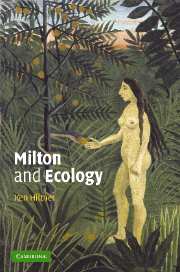Book contents
- Frontmatter
- Contents
- Acknowledgments
- Preface
- Introduction
- PART I HAVING PLACE
- 1 Place defined: the ecological importance of place
- 2 Place given: Eve as the garden's spirit of place
- 3 Place lost: Eve's Fall as an uprooting
- 4 Place regained: Sabrina puts down roots
- PART II THE UNDERLYING IMPORTANCE OF PLACE
- Notes
- Select bibliography
- Index
1 - Place defined: the ecological importance of place
Published online by Cambridge University Press: 15 December 2009
- Frontmatter
- Contents
- Acknowledgments
- Preface
- Introduction
- PART I HAVING PLACE
- 1 Place defined: the ecological importance of place
- 2 Place given: Eve as the garden's spirit of place
- 3 Place lost: Eve's Fall as an uprooting
- 4 Place regained: Sabrina puts down roots
- PART II THE UNDERLYING IMPORTANCE OF PLACE
- Notes
- Select bibliography
- Index
Summary
All that any of us may know of ourselves is to be known in relation to this place.
Wendell Berry“O unexpected stroke, worst than of Death!” When Milton's Eve learns that she and Adam are to be uprooted from the Garden, she not only cries out that it is a fate worse than Death, but in a surprising turn of events, she looks not to God's messenger, Michael, for further confirmation, but instead directly questions the Garden: “Must I leave thee Paradise?” (11.269). This is one of the few occasions in Paradise Lost where the Earth is addressed, though earlier, after surveying “Hill, and Vallie, Rivers, Woods and Plaines … Rocks, Dens and Caves,” a bitter Satan remarked to the Earth, “but I in none of these / Find place or refuge” (9.116–19). In contrast to Satan, who surveyed the entire Earth to find his place, Eve's attention next drops to where she is particularly placed – the very earth beneath her feet – to which she echoes her question in disbelief: “thus leave / Thee Native Soile?” (11.269–70). Satan searched the whole of the Earth in vain for what has been lost by Eve, which has been right under her feet all along: place, now the paradise lost.
Christopher Fitter has aptly noted of the above passage that “the utmost weight of the tragic vision in Paradise Lost falls here, in what must accordingly be one of the most crucial and carefully mediated experiences of the epic's imagination,” as this is when both Eve and Adam learn what they have lost is not only – as is so often noted – sin-free life, but in that “unexpected stroke,” the place itself.
- Type
- Chapter
- Information
- Milton and Ecology , pp. 11 - 29Publisher: Cambridge University PressPrint publication year: 2003



